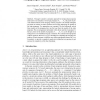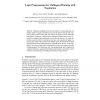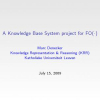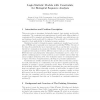211
click to vote
ICLP
2009
Springer
16 years 1 months ago
2009
Springer
We study finding similar or diverse solutions of a given computational problem, in answer set programming, and introduce offline methods and online methods to compute them using an...
184
click to vote
ICLP
2009
Springer
16 years 1 months ago
2009
Springer
The SLG-WAM of XSB Prolog soundly implements the Well-Founded Semantics (WFS) for logic programs, but in a few pathological cases its engine treats atoms as undefined that are true...
183
click to vote
ICLP
2009
Springer
16 years 1 months ago
2009
Springer
Recently, enabling modularity aspects in Answer Set Programming (ASP) has gained increasing interest to ease the composition of program parts to an overall program. In this paper, ...
203
Voted
ICLP
2009
Springer
16 years 1 months ago
2009
Springer
This paper considers a semantic approach for merging logic programs under answer set semantics. Given logic programs P1, . . . , Pn, the goal is to provide characterisations of the...
186
click to vote
ICLP
2009
Springer
16 years 1 months ago
2009
Springer
Abstract. Qualification has been recently introduced as a generalization of uncertainty in the field of Logic Programming. In this paper we investigate a more expressive language f...
199
click to vote
ICLP
2009
Springer
16 years 1 months ago
2009
Springer
PRISM is a probabilistic extension of Prolog. It is a high level language for probabilistic modeling capable of learning statistical parameters from observed data. After reviewing ...
194
click to vote
ICLP
2009
Springer
16 years 1 months ago
2009
Springer
Multiagent planning deals with the problem of generating plans for multiple agents. It requires formalizing ways for the agents to interact and cooperate, in order to achieve their...
188
click to vote
ICLP
2009
Springer
16 years 1 months ago
2009
Springer
We present a new approach to integrating Constraint Processing (CP) techniques into Answer Set Programming (ASP). Based on an alternative semantic approach, we develop an algorithm...





